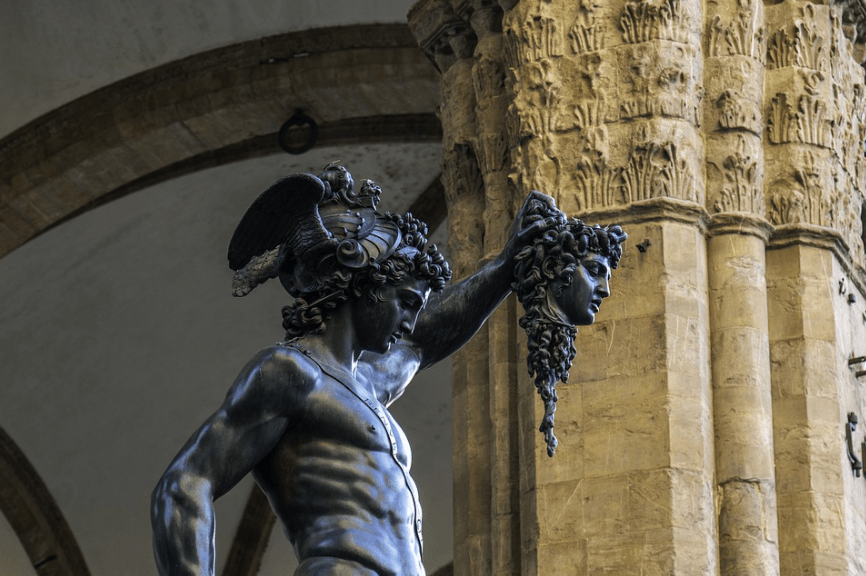Known as the herald and messenger of the gods, Hermes gained a reputable image in Greek mythology. This Olympian god of flocks and heralds, travelers and hospitality, thievery and cunning, diplomacy, language and writing, and even astronomy and astrology.
Depicted as a handsome, athletic, and beardless youthful lad or a bearded old man with winged boots (the reason behind his amazing speed) and herald’s wand, Hermes is more than his role as the personal messenger of Zeus, his father and the King of the Gods.
If you want to find out more interesting facts about Hermes, make sure to scroll further.
The birth of Hermes
Hermes, known as Mercury in Roman Mythology, is one of the twelve supreme gods of Olymus. His parents were Pleiad Maia and Zeus, the King of the Gods himself. The etymology of his name is believed to be derived from herma, which is the Greek term for “heap of stones,” which were used in several countries to indicate boundaries and landmarks.
Maia gave birth to Hermes in a mountain cave then immediately fell asleep after Hermes was born. As a new-born infant, Hermes snuck out and stole the cattle of Apollo, his half-brother to Zeus. On his way back to the mountain cave, Hermes found a tortoise and developed a lyre from its shell. After Apollo found out that Hermes stole his cattle, he demanded it back. But when Apollo approached Hermes, the latter started playing the lyre. The god of the sun was impressed that he let his brother keep his stolen cattle in exchange for the lyre.
Other accounts said that Apollo took little Hermes to Zeus and demanded back his cattle. Their father commanded Hermes to comply with the demands of Apollo, but Hermes declined that he stole the cattle. Then, Apollo found Hermes’s lyre, and by the time he heard its melodious sounds, Apollo was charmed that he demanded it in exchange for his stolen cattle.
Because of his wit, he was often referred to as the god of invention. He is credited for numerous inventions throughout the Greek history, such as the Greek alphabet, numbers, boxing, gymnastics, astronomy, and music.
Hermes as a cunning thief
Hermes’s first act of stealing as an infant immediately earned him the title “god of thieves and trickery.” In many stories, he did not use his physical strength to win over others. Instead, he used guile and his cunning personality.
He was also deemed as the god of skill and prudence, as he was cunning in both actions and words, and even perjury, fraud, and stealing. But such acts were practiced with flair, dexterity, and gracefulness.
As a trickster, he was sent out by Zeus to steal the latter’s sinews from the monster Typhon. Hermes was also the one who helped Ares, the god of war, to escape from the Aloadai giants.
Another narrative that solidifies his image as a trickster is when he disguised himself as a slave trader to sell Heracles to the Queen of Lydia.
Hermes as the messenger of gods
As a messenger, Hermes played a prominent role in other myths. He guides Perseus to the Graeae, Pandora to Epimetheus, Priam to Achilles’s tent, and more importantly, he was the one who showed Athena, Hera, and Aphrodite the path to Mount Ida where Paris was expected to choose which one of them is the fairest. He was also the one who rescued Dionysus, his brother, after his birth from the flames.
Hermes was also known as a dream god. And as a messenger, he was known to be the god of roads and doorways. It was said that every sign of luck was attributed to him.
Hermes as a traveler between the living and the dead
Hermes was known to be the only god who can cross the border between the living and the dead and guide the souls of the dead in the Underworld, wherein his brother Hades reigns. He was even referred to as the leader of sous, the conductor, patron of travelers and thieves, and Argus-slayer.
Hermes and Caduceus
Remember the stealing incident? Hermes promised not to do it again to Apollo, and as a token of promise, Apollo gifted Hermes with the caduceus.
The caduceus is commonly found in the universal symbol of medicine, and is often associated with the rod of Asclepius, Apollo’s son and the god of healing. Contrary to popular belief, the caduceus is owned by Hermes—the fastest god who had with him winged shoes and helmet to speed up his travels.
Accounts said that Hermes saw two snakes fighting each other to death. In an attempt to stop them, he threw a stick at them, but one serpent wrapped itself around it, immortalizing itself. Amazed by how things worked out, Hermes used it as his staff, which is now prominent in the emblems of companies from varying industries, such as commerce, medicine, and travel.

